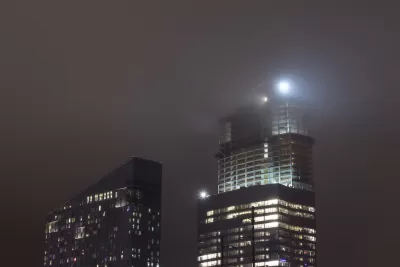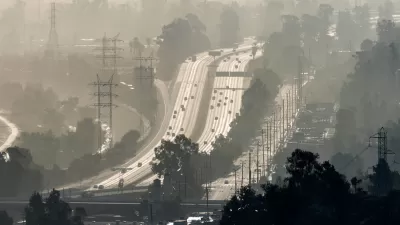Re-evaluating the role of planning in creating, and reversing, disturbing public health outcomes, like asthma rates among African-Americans in Philadelphia.

M. Sophia Newman explains the connections between planning decisions and the public health outcome of asthma rates.
More than 26 million people in the U.S. have asthma, a condition involving spasms in the lungs that makes breathing difficult; it’s among the most common chronic diseases in the country. May is Asthma Awareness Month when public-health officials hope to increase education about the condition.
The article focuses specifically on asthma rates in Philadelphia, which suffers the chronic ailment at higher rates than the rest of the state of Pennsylvania. African-American residents are particularly susceptible, caused by a century of planning and policy decisions.
The pernicious legacy of institutional racism has segregated communities of color in underserved neighborhoods in cities across the country — districts with poor-quality housing stock clustered near areas of heavy industry, transportation centers and other sources of air pollution. What’s ultimately at the core of addressing asthma and its disparities, according to a wide range of researchers, activists, and public health professionals, is not attention to race itself at all. Rather, useful interventions range from clinical care to housing policy to confronting corporate and government polluters.
The article provides insight into numerous potential solutions, both for individuals and at scale. Housing policies, such as improving the ability of tenants to remediate in-home triggers of asthma, figure prominently as solutions to the problem, as does dealing with air pollution sources that impact the public realm. On that latter point, Newman notes a lack of consensus: "The premise that outdoor air pollution aggravates asthma may be more controversial than any other in asthma care."
FULL STORY: Why Racial Disparities in Asthma Are an Urban Planning Issue

Alabama: Trump Terminates Settlements for Black Communities Harmed By Raw Sewage
Trump deemed the landmark civil rights agreement “illegal DEI and environmental justice policy.”

Planetizen Federal Action Tracker
A weekly monitor of how Trump’s orders and actions are impacting planners and planning in America.

Why Should We Subsidize Public Transportation?
Many public transit agencies face financial stress due to rising costs, declining fare revenue, and declining subsidies. Transit advocates must provide a strong business case for increasing public transit funding.

Understanding Road Diets
An explainer from Momentum highlights the advantages of reducing vehicle lanes in favor of more bike, transit, and pedestrian infrastructure.

New California Law Regulates Warehouse Pollution
A new law tightens building and emissions regulations for large distribution warehouses to mitigate air pollution and traffic in surrounding communities.

Phoenix Announces Opening Date for Light Rail Extension
The South Central extension will connect South Phoenix to downtown and other major hubs starting on June 7.
Urban Design for Planners 1: Software Tools
This six-course series explores essential urban design concepts using open source software and equips planners with the tools they need to participate fully in the urban design process.
Planning for Universal Design
Learn the tools for implementing Universal Design in planning regulations.
Caltrans
Smith Gee Studio
Institute for Housing and Urban Development Studies (IHS)
City of Grandview
Harvard GSD Executive Education
Toledo-Lucas County Plan Commissions
Salt Lake City
NYU Wagner Graduate School of Public Service





























